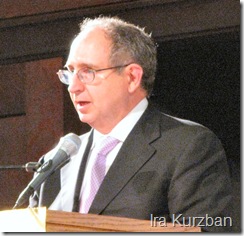Ira Gollobin: Mentor and Friend July 22, 2008
Posted by admin in : Ira, Testimonials , trackbackIra Kurzban
Miami, FL
[Remarks made at memorial service for Ira and Ruth Gollobin, July 19, 2008]
 Ira Gollobin was a remarkable lawyer, a brilliant strategist, and a superb mentor and teacher. He did it all with deep humility that arose, not from false modesty, but from a profound understanding of a lawyer’s role in the political arena.
Ira Gollobin was a remarkable lawyer, a brilliant strategist, and a superb mentor and teacher. He did it all with deep humility that arose, not from false modesty, but from a profound understanding of a lawyer’s role in the political arena.
Ira was not humble because he was afraid. He had a healthy respect for the awesome power of a federal government gone astray as in the Palmer raids, or in the treatment of Haitian refugees, or today, in the treatment of the foreign born from the Middle East. And he knew that bravado alone was not enough to fight such an implacable foe. But he also knew, and encouraged all of us to recognize, that by coordinating excellent legal work with a deft political strategy, we could uplift the poor and disenfranchised, and support if not win, their political objectives.
He also took the long view. He knew we were in a struggle that went beyond the individual crisis of the moment and invoked a class struggle that used and reused the foreign born for economic objectives. Because his perspective was so broad, he wisely counseled us to be patient and to not indulge in the delusion that we, as lawyers or as organizers, would have some final, definitive victory for immigrants and refugees. We all wanted to be dragon-slayers in our youth and Ira taught us in middle-age to be fisherman who patiently prepare and wait for the appropriate opportunity.
“Ira Gollobin taught a generation of lawyers what it meant to be an activist” |
His strategy worked remarkably well in the struggle for Haitian refugees who fought racial injustice and political intolerance. In the 1970s as more and more Haitians fled the oppression of the Duvalier regime, Haitians began seeking refuge in the United States. Those who came by airplane in the late 1960s and early 1970s went largely unchallenged by immigration authorities. However, when Haitian refugees began appearing by boat on the shores of South Florida in the mid- and late-1970s, the government acted swiftly, cruelly, and intolerantly. The entire foreign policy and intelligence apparatus of the United States would not support any suggestion that the Duvaliers were violent dictators. The local South Florida community also recoiled at the thought of having waves of the first Black refugees come to the area. Haitians, including women and children, were imprisoned in local county jails. Their treatment was in sharp contrast to that accorded Cuban refugees who were embraced by the foreign policy establishment and greeted with open arms in the South Florida community.
 Ira had already begun the defense of Haitian refugees when I arrived in Miami in 1977. He was working, in his inevitable low-key style, with the leaders in the Haitian community in Brooklyn, the National Council of Churches, the local Catholic Archdiocese in Miami, Leonard Boudin, the renowned civil rights lawyer, and a team of lawyers led by Don Bierman and Neil Sonnet in Miami to craft and organize a broad political and legal defense for Haitian refugees. Like the maestro that he was, Ira assembled a complete defense for Haitian refugees that involved these organizations and lawyers as well as brilliant lawyers, strategists and activists such as Peter Schey, Rick Swartz, Michael Hooper, and Rulx Jean Bart. Ira’s goal was not only to initiate high-profile litigation, but to develop the capacity to elicit and train lawyers and lay members of the South Florida community to prepare asylum claims on behalf of the refugees arriving in the U.S. Ira, well-knew, that without the difficult, less glamorous work of preparing and presenting asylum claims in a professional and competent manner, we could not file a law suit against the government. He also wisely understood that lay persons and lawyers taking the asylum claims would inevitably become community activists for Haitians after hearing their stories. He brilliantly managed to turn a difficult civil rights lawsuit into a broad-based political movement that challenged the entire foreign policy establishment of the United States on the grounds of racial bias and inequality. The rest of the history is well-known as lawyers in Haitian Refugee Center v. Smith, Jean v. Nelson, Haitian Refugee Center v. McNary and Haitian Refugee Center v. Baker consistently, repeatedly, and successfully challenged the government’s conduct by not only changing immigration law but the foreign policy of the United States toward Haiti.
Ira had already begun the defense of Haitian refugees when I arrived in Miami in 1977. He was working, in his inevitable low-key style, with the leaders in the Haitian community in Brooklyn, the National Council of Churches, the local Catholic Archdiocese in Miami, Leonard Boudin, the renowned civil rights lawyer, and a team of lawyers led by Don Bierman and Neil Sonnet in Miami to craft and organize a broad political and legal defense for Haitian refugees. Like the maestro that he was, Ira assembled a complete defense for Haitian refugees that involved these organizations and lawyers as well as brilliant lawyers, strategists and activists such as Peter Schey, Rick Swartz, Michael Hooper, and Rulx Jean Bart. Ira’s goal was not only to initiate high-profile litigation, but to develop the capacity to elicit and train lawyers and lay members of the South Florida community to prepare asylum claims on behalf of the refugees arriving in the U.S. Ira, well-knew, that without the difficult, less glamorous work of preparing and presenting asylum claims in a professional and competent manner, we could not file a law suit against the government. He also wisely understood that lay persons and lawyers taking the asylum claims would inevitably become community activists for Haitians after hearing their stories. He brilliantly managed to turn a difficult civil rights lawsuit into a broad-based political movement that challenged the entire foreign policy establishment of the United States on the grounds of racial bias and inequality. The rest of the history is well-known as lawyers in Haitian Refugee Center v. Smith, Jean v. Nelson, Haitian Refugee Center v. McNary and Haitian Refugee Center v. Baker consistently, repeatedly, and successfully challenged the government’s conduct by not only changing immigration law but the foreign policy of the United States toward Haiti.
Ira Gollobin was a modest man in all respects |
Despite his brilliant organizing strategy, Ira Gollobin was also a modest man in all respects. He lived modestly. He dressed like a man who felt uncomfortable in a suit and tie. He spoke in the measured tones of a modest person. I can not remember Ira ever raising his voice. And his expressions of anger were more sardonic humor than personal affront. And he never over-indulged personally or professionally. Ira was so modest about his legal work and political accomplishments that he never mentioned, and I did not know until now, that he worked on such renown cases as Kwong Hai Chew v. Colding and Harisiades v. Shaughnessy -- classic immigration cases taught in law schools through the United States. He also taught us something about how to live healthy lives. He never ate much. He asked me for a banana and an egg when he stayed at my home and we spent the rest of the day waiting for Ira to get hungry again. He never did.
I also had the good fortune of sharing Ira’s name. When I started practicing immigration law, people would come to my office and invariably confuse me with Ira. They would say: “I can’t believe that you look so young and have accomplished so much” or they would say: “I thought you were much older.” At first, I actually thought they were talking about me. Then I thought, how could they think I was in my sixties -- do I really look that old already? Of course, today, rapidly approaching sixty, they do not say anything about my age -- which is worse!
Ira Gollobin taught a generation of lawyers what it meant to be an activist. He taught a generation of activists, what good lawyering was. For those of us who chose law as a vehicle for change, Ira Gollobin was and will always be the standard to live by. His character, intelligence, and vision live within each of us and remind us that our duty is to follow his lead and to train the next generation of lawyers and activists.
Comments
Sorry comments are closed for this entry